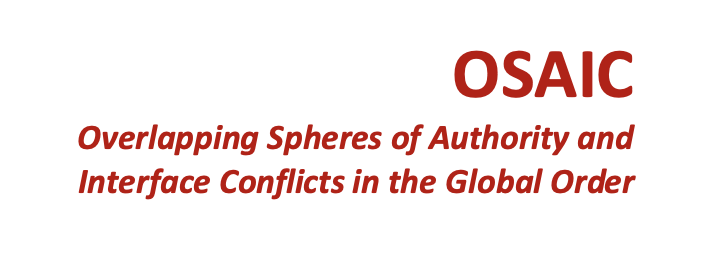Multiple Legalities: Conflict and Entanglement in the Global Legal Order
Whether a bureaucrat in an environmental ministry tries to keep track of the various reporting duties she needs to comply with, or an investor seeks to understand the law of international financial transactions; whether a human rights defender faces a multi-level system of domestic and international human rights institutions with which to engage, or a professional athlete competes in a setting where rules from various entities – states, professional associations, the competition conveners – apply, there are today few (if any) situations that are governed by only one single regulatory framework. Multiplicity, it is now widely agreed, is a condition of the law beyond and increasingly also within the state.
Of course, this is not an entirely new phenomenon. Be it the co-existence of secular and canonical law, the forced superimposition of European state law on indigenous law, or more broadly the relationships between official and unofficial forms of ordering, one might argue that some form of normative plurality has existed at all times in all places. Yet most modern legal theory has downplayed this fact, instead portraying law in a unitary, systemic frame that flattens multiplicity internally and depicts interactions between different systems as relatively unimportant, marginal occurrences. International law, too, has long resisted pluralist perspectives or attempted to re-order the multiple legalities with which actors in a globalized world are faced today. But increasingly, observers in both transnational and international law have come to converge on the importance of going beyond a simple, unitary frame to capture the relations of different legalities in the global order.
Acknowledging that law beyond the state is no hierarchically ordered system, and that multiple norms and laws might overlap, intersect and enmesh as a matter of fact, contemporary scholarship increasingly shifts attention to what comes “after fragmentation” – to the relations actors build between the many legalities that make up today’s global order. Multiplicity has many different facets: we observe not only horizontal enmeshment of different substantive legal regimes of international law, but also vertical overlaps and entanglement between domestic and international legal order(s); interactions between formal and informal legal regimes; actors who self-regulate to a large extent, yet draw on or otherwise interact with existing regimes; and both strategic and accidental interactions between different orders. These developments cut across and increasingly call into question traditional dichotomies of domestic v. international law, private v. public law and formal v. informal legal norms. They also subvert the systemic image of law when actors draw together norms from a wide variety of origins to weave new connections, loose or tight, without apparent secondary norms to guide their action.
Yet how exactly these different legalities interact and what kind of law emerges from this interaction is still far from understood. Contestation also reigns on the normative assessment of the new constellation: while fragmentation has been seen as a threat by some, others have emphasized the opportunities for open contestation that legal pluralism offers. Entangled legalities beyond the state also pose new challenges to jurisprudence, as they question the paradigmatic character that state law has long occupied in this field.
In a three-day international online conference that will be live-streamed on Verfassungsblog on January 13-15, 2021, we aim at taking stock of, and going beyond, the debate on legal multiplicity over the past years. The conference brings together scholars working in both public and private international law and transnational law, jurisprudence and legal philosophy, history and sociology of law. Our aim is to start a conversation amongst scholars who work with different theoretical lenses, normative assumptions and/or methodological tools, but who address the same empirical phenomenon: entangled legalities beyond the state.
Some of the questions we address in our panels are: How do different actors navigate law’s multiplicity today? How do they deal with conflicts and inconsistencies between different norms and layers of law? How do they construe the relations, and how are the conflicts processed – do conflicts persist or do they lead to adjustment and entanglement over time? To what extent are these normative relations framed as explicitly ‘legal’, and how? Is this multiplicity an entirely new phenomenon, or are there historical analogues? And what does this multiplicity mean for our understanding of ‘law’, ‘legal system’, and ‘legal order’; how can we best conceptualize law’s multiplicity? The law that arises out of multiplicity differs from the ideal type of modern law in its forms and institutions. Does this have implications for legal theory? The conference seeks to understand its dynamics as well as the (new) theoretical frames we need to capture it. We hope many readers of the Verfassungsblog will join us – both as listeners and as active questioners on the comment function of the blog.




The conference is organized by the Humboldt University, Berlin, and the Graduate Institute of International and Development Studies, Geneva, as part of the research group on Overlapping Spheres of Authority and Interface Conflicts in the Global Order (www.osaic.eu). The conference is made possible by the Deutsche Forschungsgemeinschaft and the Swiss National Science Foundation and is supported by the European Society of International Law. It is dedicated to the memory of Sally E. Merry, the unparalleled explorer of law’s multiplicity who was to give the introductory keynote to the conference, initially scheduled to be held in Berlin in July 2020.




[…] Birkenkötter, N. Krisch, Multiple Legalities: Conflict and Entanglement in the Global Legal Order, […]